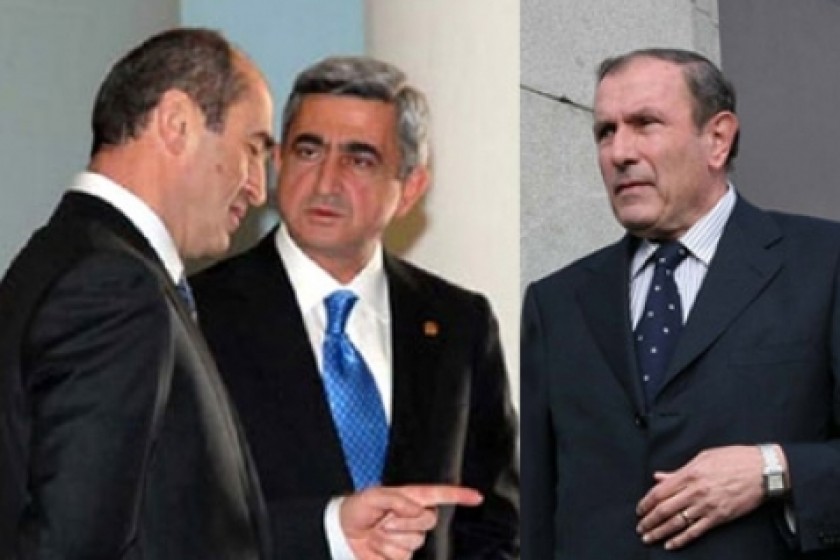
From the Bermuda Triangle to Chaos?
When the Prosperous Armenia Party, ARF-Dashnaktsutyun and Armenian National Congress announced that they would not participate in the presidential election with their own candidates or support any other candidate, it became obvious that the first and second presidents of Armenia, Levon Ter-Petrosyan and Robert Kocharian, are leaving the stage for a while.
President Serzh Sargsyan, who climbed ahead when competing with both of them, used the absolute power of the magic wand of political means and generating change. Hence, the "presidential Bermuda Triangle" that was regulating social and political developments for five years collapsed, and Sargsyan's only "ray" replaced the "triangle," at least for this presidential election.
Actually, this is a completely new, highly chaotic reality, as Serzh Sargsyan's ray seeks to rearrange the political field, not according to the classic "government-opposition" scheme, rather one of "government and others." For now, it is difficult to say how long this situation will continue and how it will influence the political system.
Everything depends on whether both former presidents will continue their backstage competition for power after the elections, or will they finally free the political forces that had been supporting their interests, giving them an opportunity to become relatively independent players.
Levon Ter-Petrosyan's statement about not participating in the presidential elections was more than unequivocal. He is almost completely out of the game, referring to the incompatibility of his age with the presidential campaign. This is a well-defined explanation, which leaves no place for maneuvers and turning back.
Ter-Petrosyan had two main problems. First of all, he couldn't ensure his self-imposed isolation in a smooth, secure way so as not to damage the integrity of his Armenian National Congress. And now he has to watch its self-destruction, trying to give the impression that he is powerless in preventing this inevitable process happening independent of his own will.
Second, he didn't succeed in appointing someone as his successor because he couldn't abandon his status of conciliator in the Congress. On the one hand he didn't want to, while on the other, he wasn't given that opportunity. It was extremely difficult to reveal such a successor in that atmosphere. Thus, we can conclude that Ter-Petrosyan is leaving active politics permanently.
Regarding Robert Kocharian, nothing is all that clear. In his last interview he alludes that he left the game only for strategic reasons and he hasn't lost the war, only the battle. Hence, something fundamentally changed in Kocharian's strategy; he is actually avoiding further confrontation with the current president to offer a so-called relay method of transferring power -- the phenomenon of the "two citizens of Karabakh."
Of course, this change was determined by the certitude of Ter-Petrosyan's final departure. By leaving, Ter-Petrosyan gives Kocharian the chance to be a little freer. It is obvious that Prosperous Armenia's moderate pressure on Sargsyan was influenced by Ter-Petrosyan's breath felt behind the backstage union of the "two citizens of Karabakh."
But the fact that Kocharian avoided being directly involved in the presidential elections and tries to compromise instead of blackmailing allows us to conclude that he doesn't feel as strong as he used to under Sargsyan's rule, while losing his former influential resources in the government.
In this sense, everything seems to be dependent on Sargsyan, not him. If Sargsyan decides not to consider Kocharian as his successor to power, then chances for his return are slim, if not completely finished. The only way he can attempt such a comeback if Sargsyan rejects his relay baton is by becoming directly involved in implementing radical changes in Prosperous Armenia and neutralizing its dependency on the government. But that would be outside the "two citizens of Karabakh" concept.
It is important for Sargsyan that the 2013 presidential elections be conducted "invulnerably," without significant competition, since it is a great chance for him to finally establish his own monolithic power. Even the oligarchy would be dependent on Serzh Sargsyan's hegemony.
Actually, two possible scenarios are likely after the elections: politics either with or without Kocharian. In the first scenario, the political system would inevitably start functioning to serve the interests of Sargsyan and Kocharian. Or else, there would be a chance to form a new political system, assuming the political forces didn't lose their potential to finally regenerate.
After the elections, the main challenge of the government, faced with the issue of self-assurance, will still be overcoming Sargsyan's policy of turning the political field into a desert. Meanwhile, by relinquishing the elections to clowns, political retirees, eternal losers, and people with low self-esteem who refuse to monitor the elections, those forces lost an extremely important fulcrum.
 Videos
Videos Photos
Photos




Write a comment